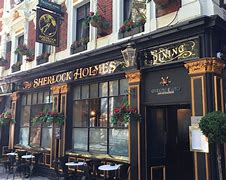Manse Everard visits Helen Tamberly in her house on York Place in London in 1885. When Julio Vasquez, twenty-second century Andean, also arrives, Everard reflects that:
"...this neighborhood had doubtless grown accustomed to exotic visitors. Not only was London the center of a planet-wide empire, York Place divided Baker Street." (p. 677)
This mention of "Baker Street" is one of three oblique references to Sherlock Holmes in the Time Patrol series. The other two are in "Time Patrol" and The Shield Of Time. By referencing both Baker Street and "...the center of a planet-wide empire...," Poul Anderson conveys the sense of great events happening even if not everyone was aware of them at the time. Many denizens of Victorian London knew nothing of the workings of the empire while even the most knowledgeable Londoners did not suspect that Dalhousie & Roberts, Importers, was the front for Time Patrol milieu HQ. What else might remain hidden below the surface or behind the scenes?

21 comments:
This also indicates that the Time Patrol history isn't -quite- ours, because it has a real Sherlock Holmes in it.
I copied this technique.
I remember other authors' characters referenced in EMBERVERSE.
Yes; Conan Doyle's, mainly, too, but from his historical works. And from Peter O'Donnell's MODESTY BLAISE.
And from John Buchan?
Kaor, Mr. Stirling!
And I think you did something similar in your Time Patrol pastiche, "A Slip in Time."
And I recall how you had Princess Orlaith reading novel called THE BROKEN SWORD, by someone named Sir Bela of Eastmarch! (Smiles)
Ad astra! Sean
Buchan is referenced in the BLACK CHAMBER series, but the author, not the characters.
John Buchan was actually a British intelligence officer in WW1 -- he didn't just write about it.
Sean: yes, I enjoyed doing that. The Norrheimers like his work too1
Got it. (I thought there was an indirect reference to Richard Hannay - unless Hannay's experience was based on Buchan's.)
Kaor, Mr. Stirling!
I'm glad the people in the old state of Maine liked THE BROKEN SWORD! And I have wondered what people born after the Change would make of such hard SF, FTL stories as ENSIGN FLANDRY?
Ad astra! Sean
Paul: I put Hannay in the SHADOWSPAWN urban fantasy series -- someone comes across a graffiti he writes while staying at the same house in Germany that he recovers in in GREENMANTLE.
Sean: that stuff becomes psychologically unavailable to them -- it's not deliberately rejected, just too strange to be interesting.
The GREENMANTLE connection. That's the one.
Kaor, Mr. Stirling and Paul!
Mr. Stirling: Hard SF like ENSIGN FLANCRY, A CIRCUS OF HELLS, and NEW AMERICA became psychologically "unavailable" to people born near to or after the Change? I can imagine people born 40 or more years after that alternate 1998 puzzling over battered copies pf those books and wondering why Grandpa likes such weird books!
Paul: Alas, I've never read any of John Buchan's books, and I know I should read at least read THE THIRTY NINE STEPS. I looked him up and he does seem a very decent and interesting man.
Ad astra! Sean
Sean,
A very conservative man (whatever we think of that). He was involved in politics and, in his fiction, was obsessed (in my opinion) with the idea of a character forced into public speaking without any preparation yet somehow making a success of it. I disliked his later Hannay book, THE THREE HOSTAGES, because the plot was entirely dependent on absurd coincidences and unexplained happenings.
Paul.
Kaor, Paul!
Well, I approve of Burkean style conservatism. And, from what I read in Wikipedia, John Buchan, first Baron Tweedsmuir, was very well liked by many people and a popular Governor General of Canada.
Ad astra! Sean
Sean,
Where you or I might say, "The King liked Buchan's books," Buchan's way of expressing that was: "He did me the honour to be amused by my romances"!
Paul.
Paul: Buchan did that quite deliberately, as he said several times.
BTW, absurd coincidences happen all the time; unlikely is not impossible.
What were the odds that Archduke Ferdinand would decide to visit the hospital, that his driver would take a wrong turning, and that he'd stall the car precisely outside the cafe where Prinzip had gone for lunch after the failure of the first assassination attempt, so that he only had to step to the curb and shoot a stationary target?
Fiction has to be credible. Real life doesn't≥
Sure but, if you've read or reread THE THREE HOSTAGES recently, I think you'll see what I mean in that particular case.
Kaor, Paul and Mr. Stirling!
Paul: I didn't see anything odd about how Buchan expressed gratification that George V enjoyed his books.
Mr. Stirling: That truly MALIGN chain of coincidences leading to the Archduke's assassination simply would not have been thought believable in fiction! I only wish one of those coincidences had not happened. E.g., Francis Ferdinand could have gone to visit the wounded at the hospital after lunch.
Ad astra! Sean
Sean,
It's a bit different to how we express things now. I am interested in social and linguistic changes. In an edition of a HG Wells novel published during Wells' lifetime, there was a list of other titles. Where we would expect the heading, "Science Fiction," it said instead:
"Mr. Wells has also written the following fantastic and imaginative romances:"
Paul.
Kaor, Paul!
I can agree with that, how linguistic changes can make us express appreciation differently from what would have been thought likely a century ago.
H.G. Wells was one of the two or three pioneers of modern science fiction, so customary forms referencing that kind of literature had yet to be worked out.
Ad astra! Sean
Post a Comment